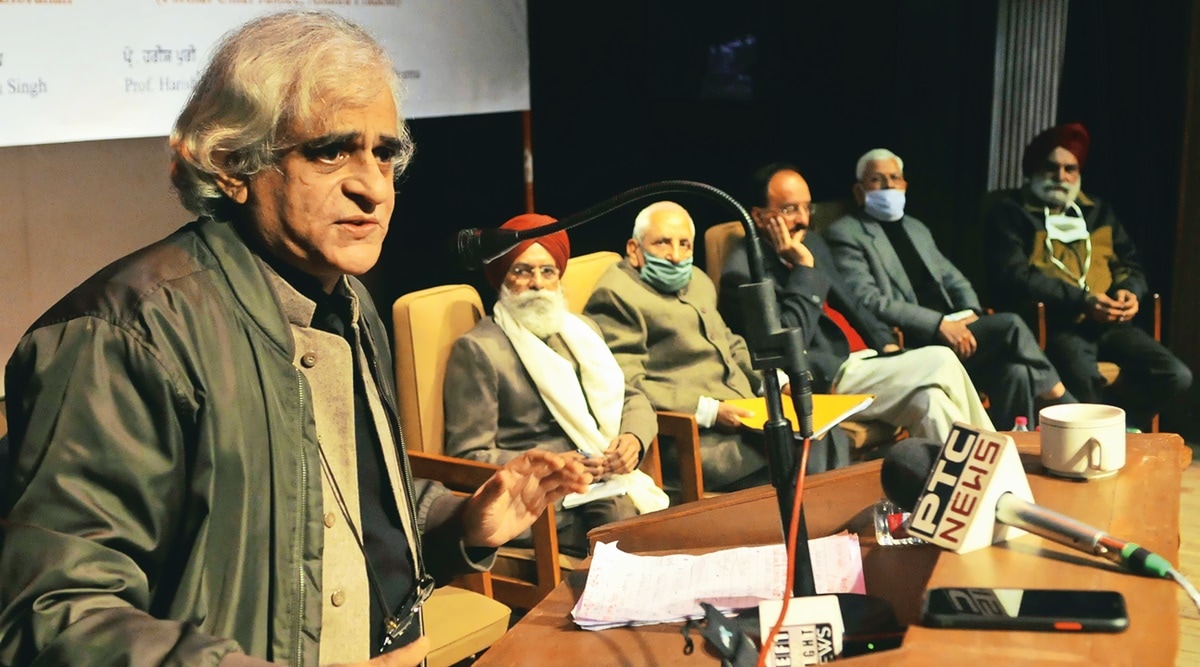 P Sainath during a lecture on rural India at Punjab Kala Bhawan in Chandigarh on Sunday. (Express photo)
P Sainath during a lecture on rural India at Punjab Kala Bhawan in Chandigarh on Sunday. (Express photo) AT 10 am on Sunday, a sea of white, the stillness and silence of the cold January morning enveloped the Punjab Kala Bhawan, Sector 16, Chandigarh. But by 10.15, the venue of the National Seminar in support of the farmers’ protest organised by the Citizens of Farmers, was abuzz with people from across the region and city, as they braved the chill and travelled to lend their support to the protesting farmers and their demands.
P Sainath, scholar on rural India and Devinder Sharma, Food and Agriculture Expert were the key speakers at the seminar, which was presided over by Justice MS Librahan, and the convenors were Prof Jagmohan Singh, Prof Harish Puri and Rajinder Singh Cheema. Two screens were set up to cater to a large audience, with people standing outside the main hall completely full.
“This is a time of darkness, but their struggle, strength and peaceful act is a ray of light. They have answered several questions and issues with this protest. It is a knock for change,” said Cheema.
Devinder Sharma took the audience through the many aspects of the farmers’ protest on New Delhi’s borders, including the background of the movement, which he said, has global implications. From low food prices for economic reforms, negligible subsidies to farmers, low and static income of farmers, Sharma cited many examples from across the world to emphasise the point of how farmers are left at the mercy of the market and are expected to fend for themselves.
He cited several studies to emphasise the losses farmers face every year, with the cycle of debts never-ending. “As a civil society, we have failed. In the jargon of reforms, we have overlooked the real issues. We have the habit of doing cut and paste of reforms, with lazy economists not providing any solutions. Agriculture is crying for a change. Agriculture is in distress and a farmer lives in debt and dies in debt. The design of economic reforms is faulty. We cannot replicate the Western models, as our farmers have small holdings. When society failed them, they had to take charge. We have kept agriculture impoverished and the farmers are cultivating losses, giving them a low MSP. They have to stand up for their rights and we need to join hands with them. This large audience here is a clear indication of support. They are fighting a battle for reinventing democracy,” said Sharma.
The expert elaborated on the importance of assured prices and how we need to build economic security for a large section of people in agriculture, with a majority depending on the harsh market. “Why should they subsidise our food? Public sector investment in agriculture is essential. It is time to rethink our design and policy. Don’t borrow failed models,” summed up Sharma.
Taking the discussion further, P Sainath talked at length about the significance of the struggle on Delhi borders. “It is not about only the laws, which they have to take back. This struggle is not only about Punjab and Haryana, it has gone beyond this. What do you want, community or corporate-led agriculture? The farmers are directly confronting the corporate. India now is a corporate-led state, with socio-religious fundamentalism and market fundamentalist ruling our lives. This protest is in defence of democracy and we are reclaiming the republic,” noted Sainath, supporting the call of farmers for holding the Republic Day Parade in Delhi on January 26.
Sainath went on to talks about how the laws will affect agriculture, questioning why the laws were passed during the pandemic and their dismal income. “It is a fatal calculation and democracy is in the ICU. Agriculture is a state subject and so these laws are unconstitutional. APMC is the government school of the education sector and APMC is the government hospital of the health sector. Reforms must be farmer and not corporate-friendly. Farmers’ universe and status have collapsed because new economic reforms have not been in sync with equality,” noted Sainath.
He explained the many aspects of the agrarian crisis, and how many allied professions have been affected by it and the importance of MSP, and how it must be related to procurement. He spoke at length about the need to discuss problems of agriculture in the Parliament. “This is one of the series of struggles, the Nation is with the farmers and this fight is ours, we need to show our solidarity,” summed up Sainath.